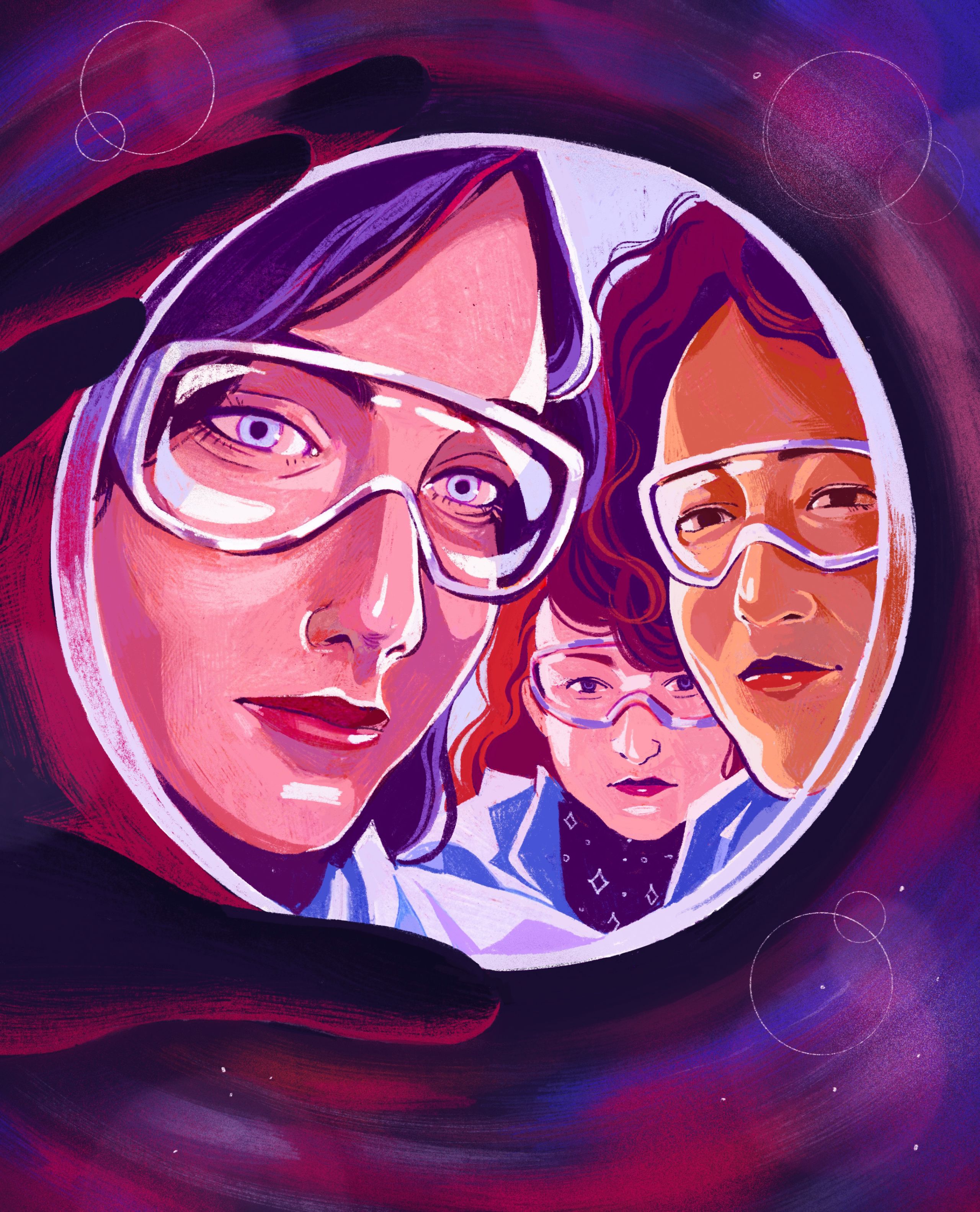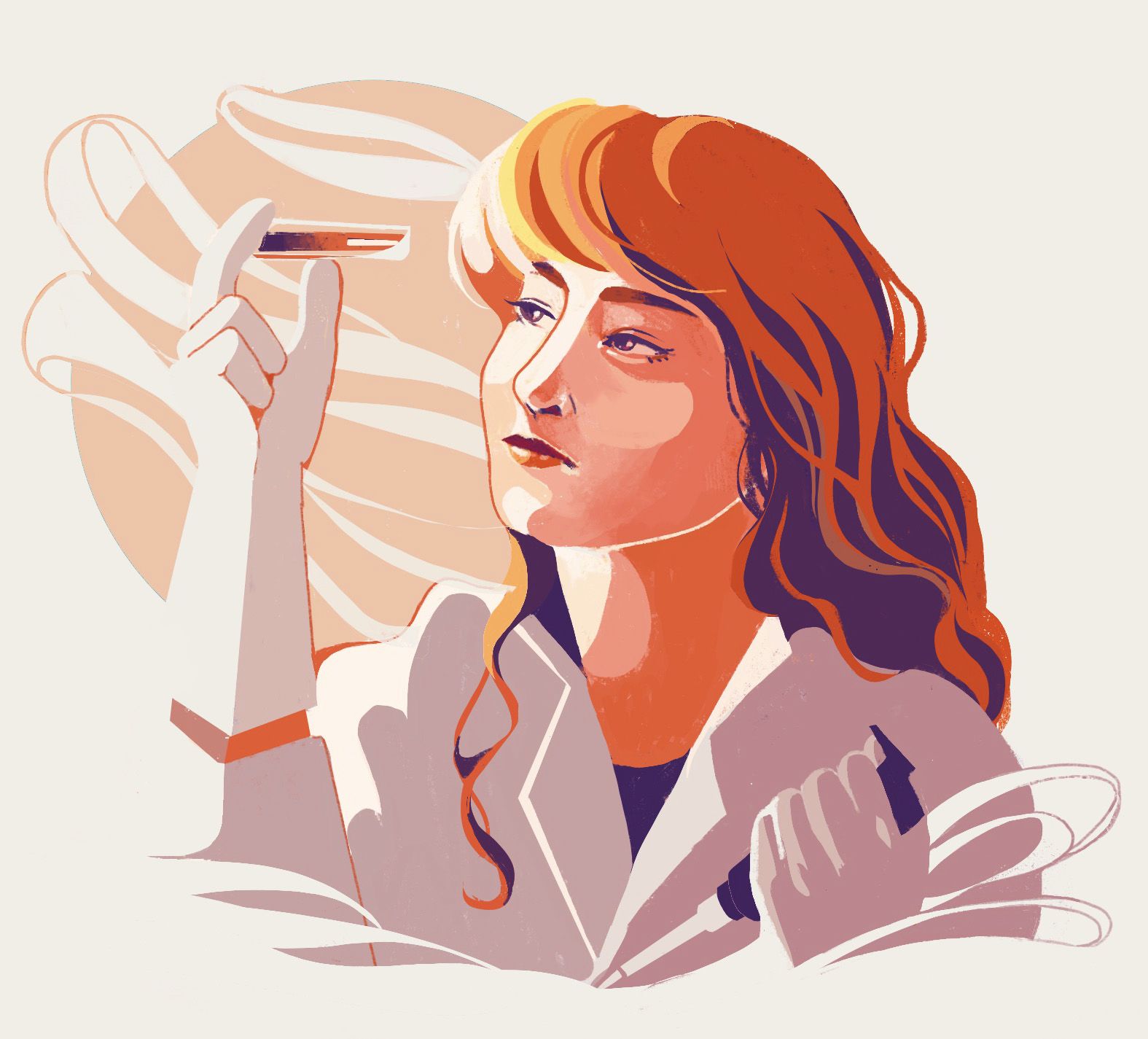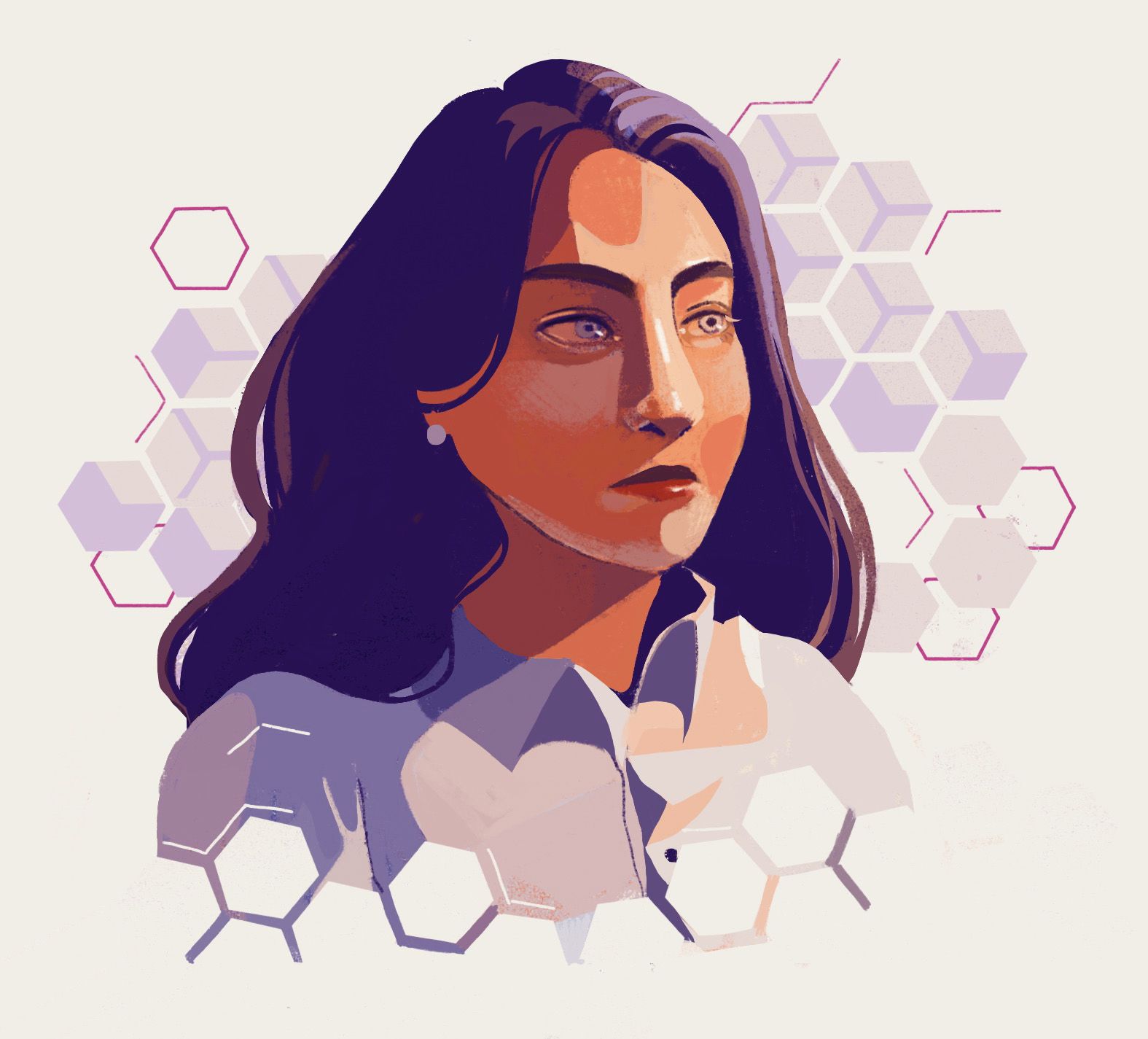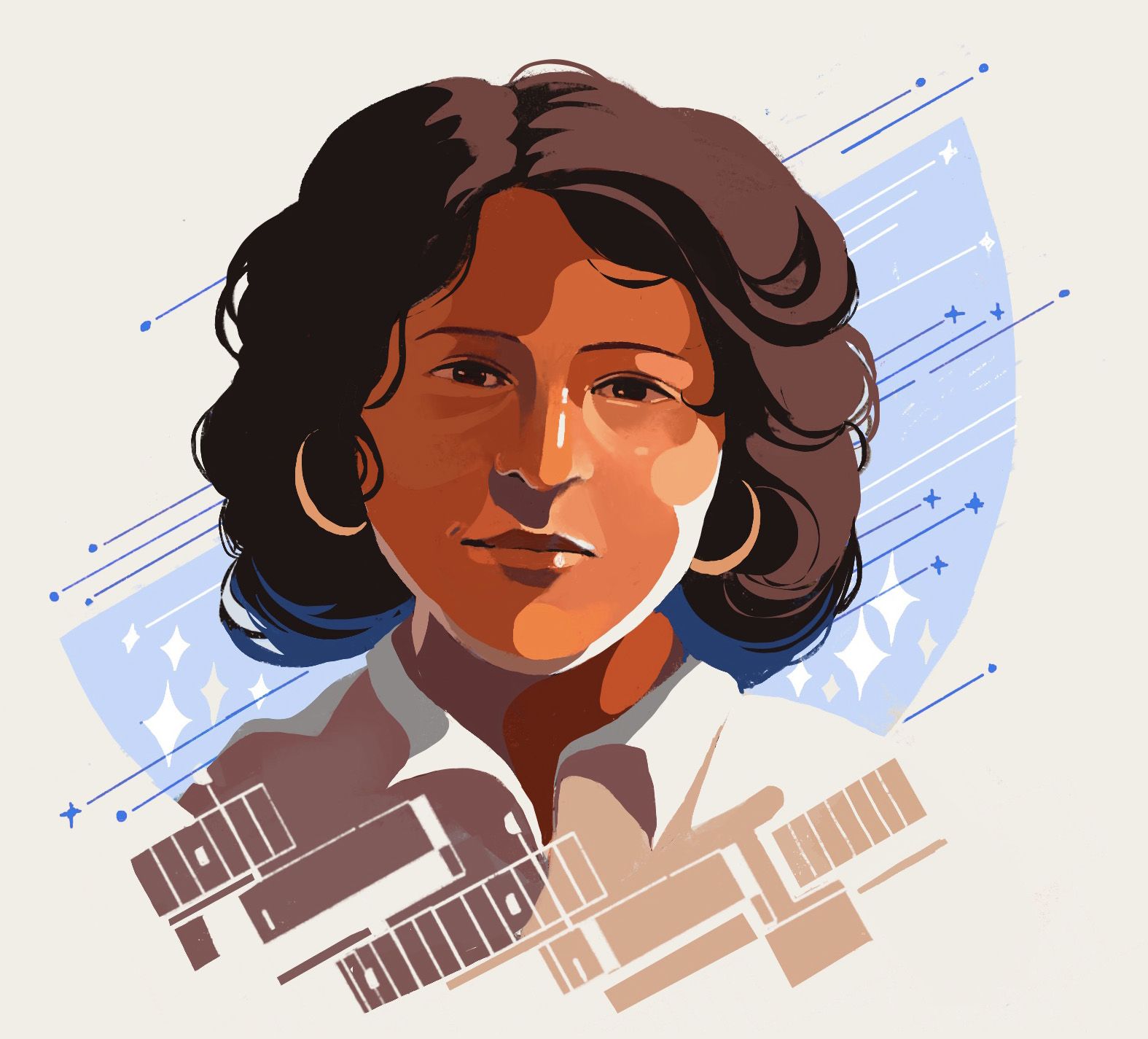Leveling the Field
How women engineers are creating more space.

By Shirine Saad
The field of engineering hasn’t always made space for women, but now women leaders are breaking new ground in discovery and research, particularly emphasizing social change. Arooj Khan, who is working to develop 3D printed organs-on-chip models; Emily Kight, pursuing solutions for Trichotillomania and ovarian cancer, and Kathleen Jenkins-Mann, team manager at NASA, are stellar graduates of Temple’s College of Engineering. Their academic research and scientific work is fueled by empathy, courage, and community. The solutions they find will have lasting effects on our societies, proving that diversity in experience leads to diversity in solutions.
“I'm not really a normal PhD candidate.”
As a teenager, Emily Kight, TFM ’11; ENG,’19, never imagined she would dedicate her life to academic research. “I didn't run out of high school and say, I'm becoming an engineer, and then everything worked out,” she says, recalling her time working at a gas station after high school. “I didn't want to go to college. It seemed expensive—I didn't know what to do. At the age of eighteen, I thought I could work in media because I like cameras and using equipment, but I didn't really find that work rewarding at all.” So Kight saved up and took a chance on an engineering degree at Temple.
Motivated by a dual passion for scientific research and helping others, Kight is currently a PhD student at Vanderbilt University, working on a dipstick urinalysis device to detect early ovarian cancer. This work is years in the making. In 2017, she founded Ovariup, a company dedicated to the detection and treatment of Ovarian cancer, which runs in her family. “I've made some devices to detect a biomarker in urine,” she explains. “And I'm adding on to that to make a urine panel by including different biomarkers in a clinically relevant cohort.”
As an undergraduate at Temple’s College of Engineering, she discovered the healing power of science when she created a treatment for a disorder she silently suffered with since childhood: Trichotillomania, or hair pulling disorder. At 26, she was used to hiding her auburn locks, struggling to resist the urge to pull. Prohibere, the leave-in conditioner she invented, diffuses a relaxing hot-cold sensation on the scalp that helps relieve patients of the compulsive disorder.
Kight credits her now-full immersion in the world of engineering to her thirst for knowledge and solutions that benefit women. “I wanted a deeper understanding of the different aspects of science and engineering...to dedicate my life to something that would be helpful to the world,” she says. “It’s important to learn how to design experiments, write a publication, and work with clinicians. The goal is to bridge the gap between unmet needs and new technology, adding value to women’s health.”
In addition to her research, Kight seeks to inspire and mentor women who might be intimidated by the field. “I want to try to reach younger women who don't see themselves doing this kind of work because that's been my path,” she says. Teaching high school students has provided Kight an avenue to share her successes, failures, and lessons with a new generation. Defying set standards of success in the field is important, especially for women.
“Policies in our country are unintentionally punitive for women,” she explains. “When you look at women’s career outcomes, who takes care of aging parents - that's time away from their careers. Taking care of children, taking them to doctor's appointments, taking time off work, all these things add up. And women's finances are [also] different than men’s, when you look at the averages.”
Kight cites several mentors in the field who have motivated her to continue her work. “My mentor Dr. Jacqueline Tanaka, a biology professor at Temple, had a baby in her mid-twenties and she still decided to go to grad school. If you talk to her, she'll have a lot to say about her experience. But I do see women who get PhDs and then seem to take a hit on their career to have kids when men don't seem to be facing that consequence.”
All said, Kight recommends that women entering engineering should trust the process, experiment with various disciplines, and avoid getting bogged down by false impediments to success. “Keep an open mind,” she advises. “I hear women say the clock is ticking, worried about when things are supposed to happen. I met one woman who became an attorney at 42. People do things at all ages.”

“I want to try to reach younger women who don't see themselves doing this kind of work because that's been my path”


Being both a woman and an immigrant in science brings a fresh perspective to the field, according to Arooj Khan, ENG ’18, a current PhD candidate at the University of Cincinnati. Her latest venture, Qurebio, focuses on creating spaces and structures for individual researchers and small companies in biotech.
“I want to become a leader in the industry so that there can be more growth and real solutions,” explains Khan, who grew up in the Netherlands and attended Temple to pursue a career in medical engineering. “When you're studying engineering, you focus on finding quick solutions to problems. Through my career, that's what I want to foster the most.”
Initially, Khan wanted to go to medical school so that she could work directly with patients, but soon realized the limitations of medical practice. ”As a doctor, you probably treat ten, maybe twenty patients a day. But a device that you develop as an engineer can reach a much larger group of patients with a specific disease, regardless of their geographical location now and in the future.”
Now, her PhD studies equally focus on scientific experiments and the commercial implementation of useful, new technologies. As a practicing engineer and academic, Khan’s latest mission is to abolish animal testing in pharmaceuticals, drugs, biologics, and the medical field as a whole. With her team, she’s developing synthetic organs on a chip that won’t require animal models for testing. 3D printing the human brain, for instance, would aid research on myriad neurological disorders and their responses to developing medications.
For Khan, a compassionate approach to the sciences is crucial, and often emphasized by women in the field.
“Women in general are more motivated within engineering when they have a social purpose or need that they're addressing,” she posits. “I think it gives you an edge, because when there is a social need at hand, you want to give it your all. You're more emotionally invested, as well as mentally invested.”
Like Emily Kight, Khan had influential mentors like Sasha Schrode, a Temple professor and the CEO of the medical device company Verix Health. Schrode taught her class, Entrepreneurial Bioengineering. “To me, she was the ideal woman in biotech that I would want to become,” she remembers. “She was balancing her personal life as well as her career and she's doing very well. “With a female mentor, you can visualize your future and the endless possibilities better, as you relate a lot more.”
As an undergraduate at Temple, Khan established an organization for Pakistani students, inviting speakers such as former Pakistani President Pervez Musharraf and sharing cultural traditions from food to calligraphy. In addition to researcher and engineer, she will soon add “Mom” to her list of titles.
“With a female mentor, you can visualize your future and the endless possibilities better, as you relate a lot more.”

On Kathleen Jenkins-Mann’s graduation day in 1983, her mother reminded her that her late father had been a civil engineer. He passed away when she was a baby and her mother, a nurse, worked through various hardships to support her twelve children, of which Kathleen was the youngest. The Philly native hadn’t been thinking of her father’s work as she enrolled in the College of Engineering, motivated by her own interests in scientific research and the prospect of a promising career.
Four decades later, Kathleen, or Kathy, Jenkins-Mann is Associate Branch Head of NASA’s Mission Systems Engineering, where she’s worked since 1991. In her tenure, she led breakthrough projects including the Hubble Space Telescope and its new update, the James Webb Space Telescope, to be launched in 2021. While the Hubble, launched in 1990, was one of the largest and most versatile astronomy devices at the time, the Webb will be the largest and most powerful ever produced.
Every day, Jenkins-Mann manages the 64 mission engineers working on developing and testing these technologies, mentoring and guiding them in their career and life choices. “At one time, I was like them, I was in a suit and mask,” she recalls from her home office in Maryland. “I was a hardware engineer. Now, under my supervision, my team is responsible for the scientific research and applications.”
Beyond discovery and innovation, Jenkins-Mann is passionate about scientific breakthroughs because they offer concrete new ways to live. For example, the Hubble telescope helped determine the age of the universe (nearly 14 billion years old) and the mass and size of the Milky Way. But its spinoff discoveries have helped provide less painful biopsies, track endangered species, and improve computer chips.
“I love seeing something start from an idea and develop – from a thought, to a technology, to a science,” she explains. “I’ve loved to watch it [all] evolve over the years.”
While at Temple, the storied engineer relished intellectually-stimulating classes and a community that welcomed her, though women of color in engineering were scarce then. That camaraderie helped inspire her to pave the way. Now, she’s the inspiration.
“My door is always open,” she explains, wary of the demands of the field. “No matter what I’m doing, I will stop and talk to my team. A lot of times, they are under stress from work or home because you work long hours. I’m interested in their well-being as engineers and I don’t want them to burn out.” Jenkins-Mann recalls the challenging realities of the workplace and how it affected her own career. “I wanted to be a division chief, but it gets lonely at the top,” she says. She turned down several opportunities over her lengthy career, prioritizing her happiness over the ambitious roles she dreamed of as an undergrad. Inspired by her mother’s resilience and compassion, she practices listening and support every day.
In her commencement address to the 2018 graduating class of Temple’s College of Engineering, as she looked out over a crowd of budding engineers from all walks of life, Kathy Jenkins-Mann impressed upon them the importance of trust:
“As children, we trusted our parents and siblings. We began to trust our grade school teachers and our friends. Along the way, we trusted our college professors to prepare us to be engineers as we embarked on our future. As you go out into the professional world, you will first need to trust yourselves.”

“I love seeing something start from an idea and develop – from a thought, to a technology, to a science...I’ve loved to watch it [all] evolve over the years.”


